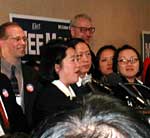New senator makes history
By William Wilcoxen
Minnesota Public Radio
January 30, 2002
|
| RealAudio |
Voters on St. Paul's East Side have elected the country's first Hmong-American legislator. Mee Moua, 32, won Tuesday's special election to fill the state Senate seat vacated by Randy Kelly, who was elected mayor last fall. DFLer Moua defeated candidates from three other parties and will immediately go to work in the legislative session that started Tuesday.
| |
|
|
|
||
Shortly after the polls closed, the excitement at Mee Moua's campaign headquarters was building to a fever pitch just as the results began to come in.
The numbers added up to a solid victory for Moua, who claimed 51 percent of the votes cast. Republican Greg Copeland had 29 percent of the votes. Independence Party and Green Party candidates received 18 percent and 2 percent, respectively. Less than two hours after the polls closed the joy was unrestrained at a victory party where the crowd chanted, "Go, Mee, go!"
It was a bilingual celebration for Mee Moua, who hugged and wept with her parents as they marked a journey that started in a Laotian village and now will extend into political history books.
Moua's father was a U.S.-trained medic in Laos, and his family was among the first wave of Hmong refugees from the 1975 communist invasion. Mee remembers absorbing the Hmong stories and traditions related by her elders during the three years her family lived in a refugee camp in Thailand.
She was nine when the family came to the U.S. and settled in Appleton, Wis., where Mee joined the Girl Scouts, the debate club, the basketball team, and the choir at the Catholic church.
| |
|
|
|
||
She struggled with English initially, but vividly remembers the day in sixth grade when she successfully read an English paragraph out loud for the first time. It was as if a dam had burst in her education and a flood of scholastic success followed. Within six years she was admitted to an Ivy League school.
After graduating from Brown University in 1992, she earned a master's degree in public policy from the University of Texas. For her master's thesis she spent four months studying Hmong street gangs in St. Paul, where her parents had moved. Moua says the experience convinced her to settle in the Twin Cities.
"I visited some of the prisons, talked to some of the young people who were incarcerated. And I felt 'Here's the talent pool in our community that's being drained away in a different direction. This is our resource loss.' And I really felt like there was a role for me here. That I needed to come back and be present. I needed to be a bridge," Moua says.
While attending law school at the University of Minnesota, Moua became involved in DFL politics, helping her uncle Neal Thao in his successful campaign for the St. Paul School Board. She joined the law firm of Leonard Street and Deinard, practicing business law, and opened a real estate office with her husband.
Moua has served as leader of the Hmong Chamber of Commerce and Hmong Bar Association. While she is proud to add the title of first Hmong legislator, she says she's even more anxious to be an effective state senator for St. Paul's East Side.
| |
|
|
|
||
"We're hitting two birds with one stone. We're getting a competent individual who can represent all of the people on the East Side. But we're also getting a sense of commitment from the Hmong people and the people of color here on the East Side that they have a stake in our political process, they have some ownership in our political process," Moua says. "They can now say 'I no longer have an excuse to be complacent or not participate. I now have a reason to do this.'"
While Moua's election blazes a new trail for the Hmong in Minnesota, it is only the latest instance of St.Paul's East Side blending another immigrant group into its recipe of ethnic diversity. Moua volunteer Joan Wittman lives near Harding High School, in the house she bought with her husband in 1958. Decades ago Wittman saw an ethnic quilt that bore some similarities to today's mix of Asian, African, Latino, and Native American.
"The churches were still rather ethnic. There still was the Polish church, there was the Irish church, there was the German church. But I think we were second and third generation. I don't think we were an immigrant population as much as what we have today," Wittman says.
Many East Siders expect more Hmong political leaders to follow Mee Moua's trail. Urban Coalition President Lee Pao Xiong, who formerly headed the Hmong American Partnership, estimates that about half of St.Paul's Hmong residents are now registered to vote, and he thinks Moua now becomes a model for future Hmong candidates.
"This is the first time that some people actually went to the polls and voted. So, they're actually using and practicing the citizenship. It's historic and it's wonderful for us," says Xiong.
Mee Moua says she will take one day to move into her office before joining her new colleagues on the floor of the state Senate Thursday.
More from MPR


